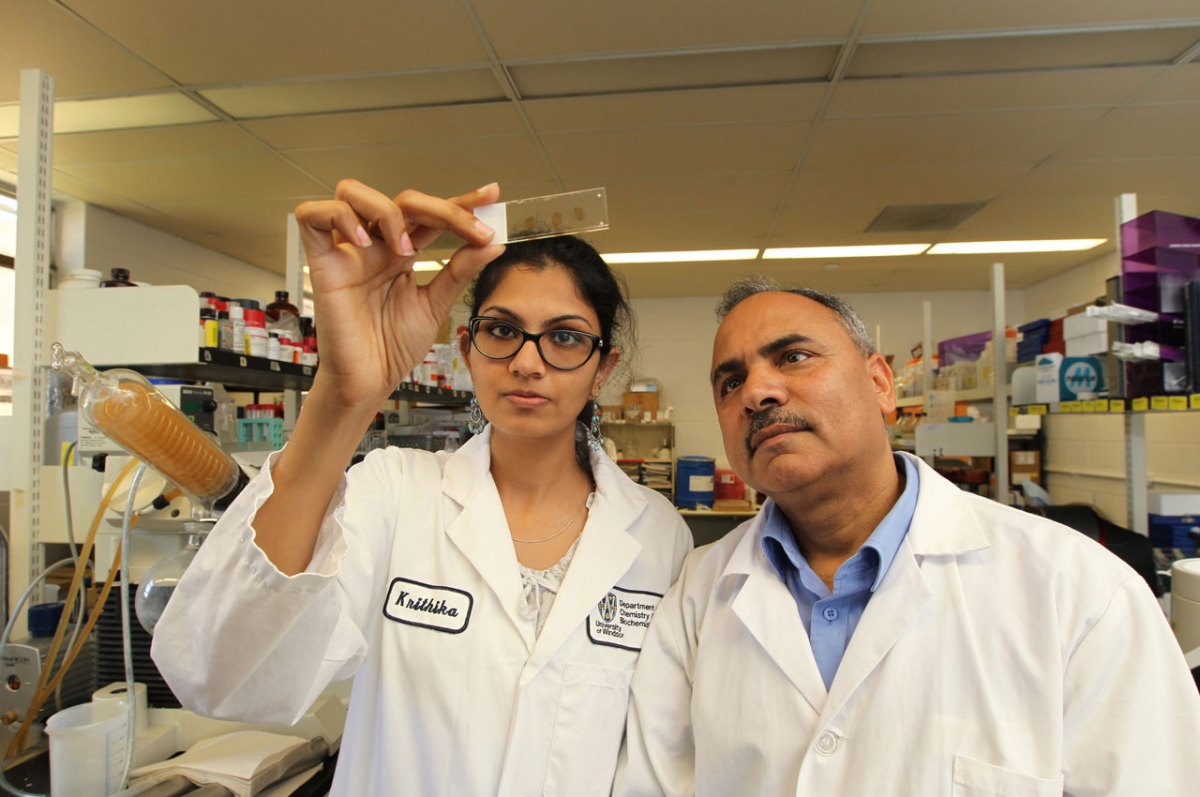
A vitamin-like nutrient that exists naturally in young brains has been shown to prevent the development of Alzheimer’s and Parkinson’s diseases in laboratory animals, according to new University of Windsor research.
PhD candidate Krithika Muthukumaran studies the antioxidant coenzyme Q10 (CoQ10) under the guidance of biochemistry professor Dr. Siyaram Pandey. In her research, she administered CoQ10 to two populations of rodents—one with an inherited form of Alzheimer’s or Parkinson’s disease, and one with a degenerative brain disorder that was triggered by an environmental toxin.
“We found that CoQ10 indeed kept the nerve cells alive and healthy,” Muthukumaran says. “We also checked to see if any of the animals developed plaque (lesions on the brain tissue) which is a symptom of Alzheimer’s, and none of them did.”
In neurodegenerative diseases, the brain’s nerve cells, or neurons, prematurely die. These neurons are crucial to the health of the brain and the body.
Cells have the ability to turn antioxidants into energy and also use them to fight potentially damaging particles called free radicals. After treating lab rodents with CoQ10, Muthukumaran and Dr. Pandey sectioned the animals’ brains, counted neurons, and found healthy cells.
“When we are young, antioxidants that exist naturally in our bodies keep our neurons healthy and prevent cell death,” says Muthukumaran. “With age, there is a decline in the levels of these natural antioxidants and hence the need to find a way to replenish them.”
She says their water-soluble CoQ10 mixture is easily absorbed into the bloodstream, reaching the brain more efficiently than oil-soluble mixtures used in previous studies.
“When we are young, antioxidants that exist naturally in our bodies keep our neurons healthy and prevent cell death.” KRITHIKA MUTHUKUMARAN
“It is hard for drugs to cross the blood-brain barrier, but even at these low CoQ10 doses it is reaching the brain in sufficient quantities,” says Muthukumaran. “The great thing about this formulation is that we just gave the rats and mice a low dosage in their drinking water. There are no injections or pills required.”
Muthukumaran and Pandey collaborated with Dr. Jerome Cohen and the UWindsor Department of Psychology to monitor the mice for behaviour and motor control because neurons that die due to Parkinson’s are responsible for hand tremors, loss of automatic movements, and rigid muscles.
“One of the best aspects of this collaboration was getting to work with Dr. Jerome Cohen and the psychology department because, beyond counting neurons, we can prove that these mice are also not exhibiting symptoms of memory loss or losing control of motor skills,” she says.
An aging population means that, by 2030, one in five North Americans will be at least 65 years old. Muthukumaran says this will likely result in a sharp rise in age-related brain disorders.
“The statistics are so scary, and this is not just about the number of people being diagnosed, but their caregivers as well. So, it is dire we quickly find an effective therapy.”
The team will continue this line of research by treating animals with CoQ10 after they have developed plaque, to test whether it halts or slows down lesion formation.
“CoQ10 is a non-toxic chemical without negative side effects that doesn’t accumulate in the body. So, eventually, we’d love for this study to go to clinical trial,” Muthukumaran says.